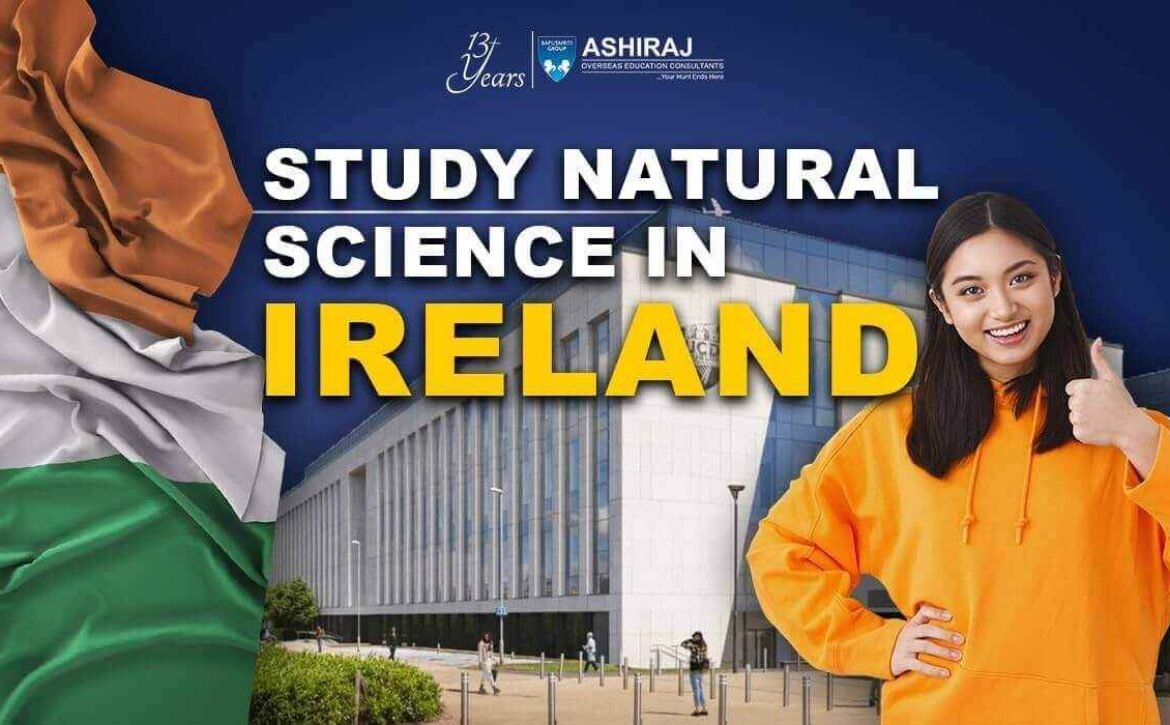
Natural Science in Ireland
In Ireland, the realm of Natural Science unfolds as a captivating tapestry woven with the rich threads of its diverse landscapes and ecosystems. From the windswept cliffs of Moher to the serene lakes of Killarney, the scientific exploration of Ireland’s natural wonders is a journey through geological marvels, ecological intricacies, and biological diversity. Natural Science in Ireland encapsulates a profound study of the country’s flora and fauna, delving into the intricate dance of ecosystems that define its breathtaking scenery.
The scientific community in Ireland, deeply rooted in a legacy of curiosity and inquiry, thrives on unraveling the mysteries embedded in the nation’s natural fabric. Through rigorous research and a commitment to environmental stewardship, Natural Science in Ireland stands at the forefront of global efforts to understand and preserve the intricate balance of the natural world. As scholars and scientists engage with Ireland’s unique ecosystems, they contribute not only to the academic discourse but also to the collective responsibility of safeguarding the country’s natural heritage for generations to come.
Why to Study Natural Science in Ireland?
- Diverse Ecosystems: Ireland’s breathtaking landscapes, from lush green meadows to rugged coastlines, serve as living laboratories for aspiring natural scientists.
- Unique Flora and Fauna: The study of Natural Science in Ireland offers an opportunity to explore and understand the country’s distinctive plant and animal life, contributing to global biodiversity knowledge.
- Cutting-Edge Research Facilities: Irish universities boast state-of-the-art research facilities, providing students with access to cutting-edge technology and fostering an environment conducive to scientific exploration.
- Cultural Integration: Studying Natural Science in Ireland is not just about academia; it’s also about immersing oneself in a vibrant culture that values and respects the environment, enhancing the overall learning experience.
- Global Relevance: Ireland’s commitment to sustainability aligns with the global discourse on environmental conservation, making the knowledge gained in Natural Science programs in the country highly relevant on an international scale.
- Research Opportunities: The dynamic research community in Ireland opens doors to exciting opportunities for students to actively engage in groundbreaking projects, contributing to the advancement of scientific knowledge.
- Future Sustainability Leaders: Education in Natural Science in Ireland equips students to become the next generation of leaders in environmental sustainability, addressing pressing global challenges.
Embarking on a journey to study Natural Science in Ireland is not merely an academic pursuit; it’s an immersive experience that intertwines scientific inquiry with the soul-stirring beauty of Ireland’s natural wonders.
Top Universities to Study Natural Science in Ireland
University | QS World University Ranking 2023 | Type of University | Average Annual Fees | Programs Offered |
University College Dublin | 177 | Public | €12,825-€29,000 | BSc in Natural Sciences, MSc in Environmental Science |
Trinity College Dublin | 108 | Public | €16,672-€28,000 | BA in Natural Sciences, MSc in Biodiversity and Conservation |
University of Limerick | 511-520 | Public | €12,000-€14,000 | BSc in Environmental Science, MSc in Applied Science |
National University of Ireland, Galway | 259 | Public | €14,000-€25,000 | BSc in Earth and Ocean Sciences, MSc in Marine Biology |
Dublin City University | 391-400 | Public | €13,000-€16,000 | BSc in Environmental Science, MSc in Bioprocess Engineering |
Embarking on a Natural Science education in Ireland opens doors to renowned institutions that stand tall in the QS World University Rankings 2023. University College Dublin, securing the 177th position, offers diverse programs such as BSc in Natural Sciences and MSc in Environmental Science. Trinity College Dublin, ranking at 108, provides a rich academic environment with offerings like BA in Natural Sciences and MSc in Biodiversity and Conservation. The University of Limerick, nestled between the 511th and 520th positions, presents programs like BSc in Environmental Science and MSc in Applied Science. The National University of Ireland, Galway, at 259, specializes in Earth and Ocean Sciences for undergraduates and Marine Biology at the postgraduate level. Dublin City University, positioned at 391-400, offers programs like BSc in Environmental Science and MSc in Bioprocess Engineering. With varying fee ranges and comprehensive programs, these universities pave the way for a holistic Natural Science education in the captivating landscapes of Ireland.
Course Curriculum for Natural Science in Ireland
- Foundational Sciences:
Begin with core courses covering fundamental principles in biology, chemistry, and physics, laying the groundwork for specialized studies.
- Mathematics and Statistics:
Emphasize quantitative skills with coursework in mathematics and statistics, essential for scientific analysis and research.
- Environmental Science:
Explore the dynamic field of environmental science, addressing issues such as conservation, climate change, and sustainable practices.
- Specialized Tracks:
Choose from specialized tracks like Ecology, Genetics, or Geophysics, allowing students to tailor their studies to specific areas of interest within Natural Science.
- Laboratory Work:
Engage in hands-on laboratory work, gaining practical experience in applying theoretical knowledge to real-world scenarios.
- Research Projects:
Undertake research projects, fostering critical thinking and problem-solving skills while contributing to scientific advancements.
- Interdisciplinary Studies:
Encourage interdisciplinary studies, promoting a holistic understanding of the interconnectedness of various scientific disciplines.
- Field Excursions:
Benefit from field excursions to explore Ireland’s diverse ecosystems, providing firsthand experiences and enhancing practical knowledge.
- Advanced Topics:
Progress to advanced topics such as Bioinformatics, Quantum Mechanics, or Environmental Policy, depending on the chosen specialization.
- Capstone Projects:
Culminate the program with capstone projects, allowing students to showcase their mastery of Natural Science concepts and apply them to real-world challenges.
The course curriculum of Natural Science in Ireland is designed to offer a comprehensive and dynamic learning experience. With a blend of foundational sciences, specialized tracks, practical laboratory work, and interdisciplinary studies, students are well-equipped to navigate the complexities of the natural world. Field excursions and research projects further enrich the educational journey, making Natural Science in Ireland a robust and engaging academic pursuit.
Eligibility Criteria & Admission Requirements for Natural Science in Ireland
- Language Proficiency:
Applicants must demonstrate proficiency in English through either IELTS or TOEFL.
IELTS score: Minimum of 6.5 overall with no band below 6.0.
TOEFL score: Minimum of 90, with a minimum of 20 in each section.
- Standardized Tests:
For postgraduate studies, candidates may need to submit GRE or GMAT scores.
GRE scores: Varies by university; typically, a score above 300 is competitive.
GMAT scores: Varies by university; a competitive score is usually above 550.
- Academic Certificates:
Applicants are required to submit academic transcripts and certificates, demonstrating a strong academic background in relevant subjects.
- Work Experience:
While work experience is not mandatory for undergraduate programs, some postgraduate programs may prefer candidates with relevant work experience.
- Passport & Student Visa:
A valid passport is necessary for international students.
Successful applicants must obtain a student visa to study Natural Science in Ireland.
Table: Required Scores for Language Proficiency and Standardized Tests
Test | Minimum Score |
IELTS | Overall 6.5, no band below 6.0 |
TOEFL | Minimum 90, with a minimum of 20 in each section |
GRE | Varies by university; typically above 300 |
GMAT | Varies by university; typically above 550 |
Ensuring eligibility for Natural Science programs in Ireland involves meeting language proficiency requirements, presenting competitive GRE or GMAT scores, and submitting academic credentials. Additionally, securing a valid passport and obtaining a student visa are crucial steps in the journey to pursue Natural Science in Ireland.
Documents Required for Studying Natural Science in Ireland
- Passport:
A valid passport is essential for international students. Ensure it has sufficient validity beyond the intended duration of your stay.
- Letters of Recommendation (LOR):
Provide two well-drafted LORs from academic or professional referees attesting to your qualifications and suitability for the Natural Science program.
- Statement of Purpose (SOP):
Craft a compelling SOP outlining your academic and career goals, and why you are passionate about studying Natural Science in Ireland.
- Curriculum Vitae (CV):
Prepare a detailed CV that highlights your academic achievements, relevant skills, and any research or work experience related to Natural Science.
- Official High School Transcripts:
Submit transcripts from your high school, demonstrating your academic performance and qualifications for admission.
- Educational Certificates:
Include copies of certificates and diplomas that validate your educational background, particularly those relevant to Natural Science.
- Work Experience Certificate:
If applicable, provide a certificate detailing any relevant work experience in the field of Natural Science.
- Proof of Financial Resources:
Demonstrate your ability to cover tuition and living expenses by submitting proof of financial resources, such as bank statements or sponsorship letters.
Ensuring a comprehensive application for Natural Science in Ireland involves assembling a set of crucial documents. From the foundational passport to academic transcripts and the pivotal SOP, each document contributes to presenting a holistic profile. These meticulous preparations pave the way for a smooth application process, emphasizing your commitment to pursuing Natural Science in Ireland.
Admission Process for Natural Science in Ireland
- Research and Choose Universities:
Explore universities in Ireland offering Natural Science programs. Consider factors like rankings, faculty, and program specifics.
- Check Eligibility:
Ensure you meet the eligibility criteria, including language proficiency (IELTS or TOEFL) and standardized test scores (GRE/GMAT for postgraduate programs).
- Prepare Required Documents:
Assemble necessary documents, such as passport, LORs, SOP, CV, official transcripts, educational certificates, work experience certificates, and proof of financial resources.
- Submit Online Application:
Complete the online application form for the chosen universities. Pay attention to deadlines and provide accurate information.
- Pay Application Fee:
Pay the required application fee as specified by each university. This step is crucial for processing your application.
- Wait for Admission Decision:
Patiently await the admission decision. Universities may take some time to evaluate applications.
- Acceptance and Visa Process:
Upon receiving an offer, accept it and initiate the student visa application process. Ensure all necessary documents are submitted for visa approval.
- Travel to Ireland:
Once the visa is approved, plan your travel to Ireland. Attend orientation sessions provided by the university.
- Commence Natural Science Studies:
Finally, begin your academic journey in Natural Science in Ireland. Engage with professors, fellow students, and the vibrant academic community.
Navigating the admission process for Natural Science in Ireland involves careful research, document preparation, and adherence to deadlines. By following these steps, you set the foundation for a successful enrollment in a program that aligns with your academic and career aspirations in the realm of Natural Science in Ireland.
“Education is the most powerful weapon which you can use to change the world.”
Nelson Mandela
Cost of Natural Science Course in Ireland
- Tuition Fees:
Tuition fees for Natural Science programs in Ireland vary. On average, undergraduate programs range from €12,000 to €30,000 per year, while postgraduate programs may cost between €13,000 and €25,000 annually.
- Accommodation:
Accommodation costs depend on the type and location. On-campus housing or shared apartments may range from €400 to €1,000 per month.
- Living Expenses:
Monthly living expenses, including food, transportation, and personal items, are estimated at approximately €700 to €1,000, depending on lifestyle.
- Health Insurance:
International students are required to have health insurance, costing around €500 to €1,000 per year.
- Books and Supplies:
Budget for books and supplies, which can range from €500 to €1,000 per academic year.
- Miscellaneous Costs:
Miscellaneous expenses such as visa fees, travel, and social activities may incur additional costs.
- Part-Time Work Opportunities:
International students are allowed to work part-time during studies. This can help offset living expenses.
Understanding the cost of studying Natural Science in Ireland is crucial for effective financial planning. While expenses vary, considering tuition, accommodation, and living costs ensures a well-prepared and budget-conscious approach to pursuing Natural Science in Ireland.
Scholarships for Natural Science Courses in Ireland
Scholarship Name | Eligibility Criteria | Amount | Application Deadline |
Government of Ireland Scholarships | Open to non-EU/EEA students pursuing full-time Natural Science programs. | €10,000 tuition fee waiver | Varies (typically March) |
Trinity College Dublin Scholarships | Merit-based scholarships for outstanding academic achievements. | Up to €5,000 | May 1st |
University College Dublin Global Excellence Graduate Scholarship | Open to international students applying for postgraduate Natural Science programs. | Up to 50% tuition fee reduction | Varies (check with department) |
National University of Ireland, Galway International Student Scholarships | Available for high-achieving international students enrolling in Natural Science courses. | €1,500 – €3,000 | June 30th |
Dublin City University International Merit Scholarships | Merit-based scholarships for undergraduate and postgraduate Natural Science students. | Up to €2,000 | June 1st (undergraduate), June 15th (postgraduate) |
Securing financial support is crucial for international students pursuing Natural Science in Ireland. The Government of Ireland Scholarships, offering a €10,000 tuition fee waiver, and university-specific scholarships, such as those from Trinity College Dublin and University College Dublin, provide significant financial assistance. Keep an eye on application deadlines, with some scholarships having specific dates, like May 1st for Trinity College Dublin and varying dates for the Government of Ireland Scholarships. Planning accordingly and exploring these opportunities enhances the feasibility of studying Natural Science in Ireland.
Career Opportunities After Natural Science in Ireland
Job Profile | Description | Average Salary (annually) |
Environmental Scientist | Conduct research and analysis to address environmental issues. | €35,000 – €45,000 |
Biotechnologist | Work with living organisms and biological systems for various applications. | €40,000 – €55,000 |
Data Analyst | Analyze and interpret complex data sets to provide insights and solutions. | €35,000 – €50,000 |
Research Scientist | Design and conduct experiments, analyze data, and contribute to scientific advancements. | €40,000 – €60,000 |
Geologist | Study the Earth’s structure, composition, and processes to inform resource management. | €40,000 – €55,000 |
Embarking on a career after completing Natural Science in Ireland opens doors to diverse and rewarding job profiles. Environmental Scientists play a crucial role in addressing environmental concerns, earning an average salary of €35,000 to €45,000 annually. Biotechnologists, working with living organisms, can expect salaries ranging from €40,000 to €55,000. Data Analysts, interpreting complex datasets, earn approximately €35,000 to €50,000 per year. Research Scientists, contributing to scientific advancements, have salaries in the range of €40,000 to €60,000. Geologists, studying the Earth’s processes, earn an average salary of €40,000 to €55,000. These career opportunities underscore the versatility and potential for growth in the field of Natural Science in Ireland, providing a pathway to fulfilling and well-compensated professional journeys.
Frequently Asked Questions About Natural Science in Ireland
Natural Science is a broad field that includes disciplines like biology, chemistry, physics, and environmental science. In Ireland, it covers diverse aspects of the natural world.
Admission requirements typically include language proficiency (IELTS or TOEFL), academic transcripts, standardized test scores (GRE/GMAT for some programs), and a well-crafted Statement of Purpose.
Yes, several scholarships are available, such as the Government of Ireland Scholarships, university-specific scholarships, and international student scholarships offered by institutions.
The cost varies but includes tuition fees (€12,000-€30,000 for undergraduates, €13,000-€25,000 for postgraduates), accommodation, living expenses, and additional costs.
Yes, international students are generally allowed to work part-time during their studies to help with living expenses.
Career opportunities include roles like Environmental Scientist, Biotechnologist, Data Analyst, Research Scientist, and Geologist, with average salaries ranging from €35,000 to €60,000 annually.
The duration varies, with undergraduate programs typically taking 3-4 years and postgraduate programs ranging from 1-2 years.
Yes, international students must demonstrate proficiency in English through tests like IELTS (6.5 overall) or TOEFL (minimum 90).
Prominent universities include University College Dublin, Trinity College Dublin, University of Limerick, National University of Ireland, Galway, and Dublin City University.
Once accepted into a program, applicants can apply for a student visa by submitting necessary documents, including the acceptance letter, proof of financial resources, and passport details.




